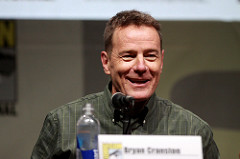Share This Article:
Return to Silver Screen Central Home page


Bryan Cranston could have used Dalton Trumbo’s help with this script.
BDalton Trumbo may have been the best screenwriter ever to work in Hollywood as well as one of the most controversial. His life and times certainly merit Hollywood treatment of their own. Surprisingly, however, the primary weakness of the slick new biopic Trumbo is its script, one that could have used a rewrite by the scribe himself.
The film focuses on the most chaotic period in the life of Trumbo (Bryan Cranston in his first major film starring role), from the late 1940’s until the early 60’s. When the House Un-American Activities Committee began to investigate supposed Communist influence in the film industry, he refused to give straight answers when called to testify and, as a result, went to jail for contempt. Once released, Trumbo was blacklisted and unable to produce scripts under his own names but kept busy writing under other people’s names for several years, winning two Oscars. His unofficial Hollywood banishment ended when he received onscreen credit for the scripts of Spartacus and Exodus.
Trumbo was directed by Jay Roach whose career is a mixture of big screen silliness (Meet the Parents) and more prestigious HBO docudramas (Game Change). The movie actually plays like one of Roach’s HBO projects that got a theatrical release. The talented acting ensemble does a fine job, especially those playing well-known celebrities (Helen Mirren as Hedda Hopper, Michael Stuhlbarg as Edward G. Robinson, David James Elliott as John Wayne). However, Trumbo is essentially a series of often broadly played comic vignettes, such as John Goodman as a schlock producer using a baseball bat to threaten a studio hack who wants Trumbo fired. These bits usually work, and Bryan Cranston is excellent at glibly dispensing quotable one-liners. But the movie glosses over the more serious issues it raises. When a fellow writer (Louis C.K. in the scene below) asks just how Trumbo can square his supposed radical beliefs and his strongly capitalistic work ethic, neither he nor the movie ever adequately respond. Similarly, the toll that Trumbo’s hectic pace and subterfuge take on his family doesn’t get the attention it deserves. The most valuable service the movie provides is to give many in the audience an introduction to an era that remains an embarrassment to this day for Hollywood. Trumbo does so in a glib, entertaining manner, but it never manages to really probe very far beneath the glitzy Hollywood façade it depicts so well.
Continue reading on Trumbo: Mini-review
Recent Comments